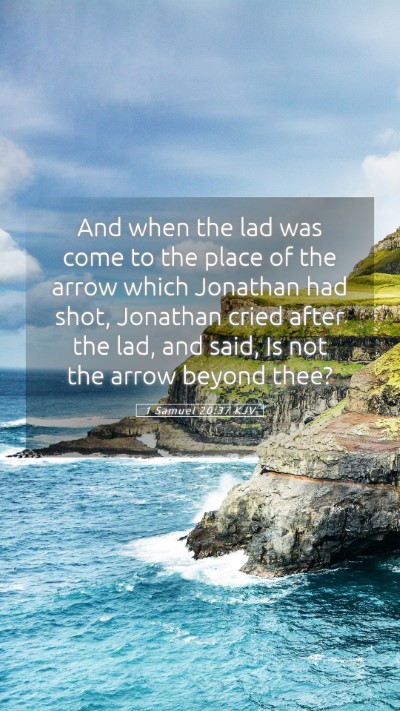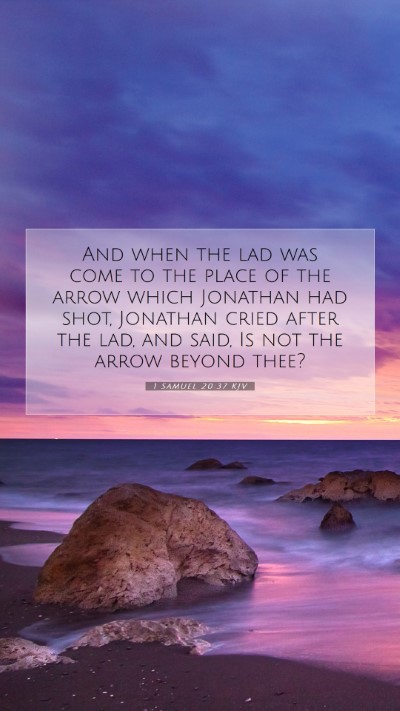Bible Verse Meaning for 1 Samuel 20:37
The verse 1 Samuel 20:37 states:
"And when the lad was come to the place of the arrow which Jonathan had shot, Jonathan cried after the lad, and said, Is not the arrow beyond thee?"
This verse encapsulates a significant moment in the friendship between Jonathan and David, highlighting themes of loyalty, communication, and the perils of royal politics.
Contextual Overview
This passage occurs within a deeply emotional narrative in 1 Samuel. David, who has been favored by God and the people of Israel, is now the target of King Saul's jealousy. Jonathan, Saul's son and David's close friend, is caught between familial loyalty and his allegiance to David. Their secretive communication, using a boy to fetch arrows, underscores the precarious nature of their situation.
Commentary Insights
- Matthew Henry: Henry emphasizes the ingenuity and caution displayed by Jonathan in relaying the danger to David. The act of shooting arrows serves as a method of covert communication, showcasing their bond. This underscores a profound understanding among friends where danger looms, reflecting the ways true friends protect one another.
- Albert Barnes: Barnes interprets the arrow as a symbol of Saul's intent. The phrase "Is not the arrow beyond thee?" indicates a warning that David must flee. Barnes highlights the deep sadness in Jonathan's voice, reflecting the sorrow of betrayal and the impending separation between the two friends that is dictated by the circumstances of Saul's wrath.
- Adam Clarke: Clarke points out the strategic nature of the arrow's placement, indicating Jonathan's intelligence and the careful planning behind their messages. He also discusses the historical background, illustrating the gravity of the situation and underscoring the vital necessity of wisdom and prudence in their exchange.
Thematic Exploration
1 Samuel 20:37 opens avenues for Bible verse understanding in several thematic areas:
- Loyalty and Friendship: The relationship between Jonathan and David serves as a paradigm for deep, enduring friendship, transcending political ideologies and family ties.
- Danger and Escape: The necessity of secrecy in this verse portrays the constant danger faced by David and signifies broader themes of divine protection and providence.
- Communication in Crisis: The unique method of communication through arrows reveals how critical it is to convey messages thoughtfully, especially in dire circumstances.
Applying the Verse Today
When interpreting this verse, modern readers can draw several applications:
- Friendship Loyalty: Reflect on how to support friends during tough times and what it means to put your friendship above societal or familial expectations.
- Dangers in Relationships: Consider the dynamics of personal relationships and the external pressures that might threaten them.
- Understanding Non-Verbal Cues: As communication is key, learn the significance of understanding unspoken messages within relationships today.
Conclusion
The story surrounding 1 Samuel 20:37 is rich in Biblical exegesis and presents many insights relevant to both historical and modern contexts. By grasping the intricacies of this relationship and the societal implications of their actions, readers can gain a greater Bible verse commentary and appreciation for the Scriptures.
Cross References
- 1 Samuel 18:1-4 - The friendship between Jonathan and David.
- 1 Samuel 19:1-7 - Jonathan's defense of David to Saul.
- 1 Samuel 23:16-18 - Jonathan encouraging David during his trials.


